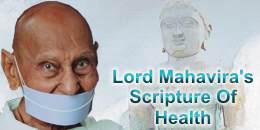
'Aman’ or absence of the mind is an important word. The mind passes through various states. One of the states is also that in which the mind ceases to be. That is the state of 'Aman’. The distinction that the chitta is enduring and the mind is the creation should be clearly understood. There is the mind if we create it. Where would the mind be if we do not create it? The mind, the speech and the body are the three factors. Among them the case of the mind and the speech is the same. The body would continue to exist so long as man is alive. In the case of the speech and the mind, we may create them when we wish and give them rest when we wish to do that. That is why the mind is not situated anywhere. We create it. If we do not create the mind, the state of 'Aman' will prevail. That is not the case with the chitta. The chitta cannot be created. Just as the body is continuously with us, the chitta is also continuously with us. The chitta will be continuously with us, whether we are asleep or awake. The chitta will continue its function. It is our consciousness which is never extinct. That is why the acharyas of Nyayashastra made certain statements I had a sound sleep today. Who experiences it? The mind was inactive. Who experiences that he had a sound sleep? It is the function of the chitta. Someone is not able to sleep well. He goes on turning on his sides every now and then. Who experiences this? It is not the function of the mind but of the chitta.
The chitta is a ray of consciousness. All this is the function of the chitta. It is necessary to clarify that the functions of the chitta and the mind are separate. The first creation of the chitta is the bhava. It is not the mind that is the first creation of the chitta. The chitta creates the bhava which emanates from within. All our emotions are the creation of the chitta. That is why the chitta is of several types. It can be said on the basis of the bhava that a particular chitta is characterized by anger. In the same way, there is the chitta marked by vanity, greed, hatred, quarrel and so on. All these bhavas are created by the mind. Manobhava is a term very much in vogue in literature. It means the bhava passing into the mind. The mind does not create the bhava. Creating the bhava is not the function of the mind. It is the chitta that creates the bhava. The bhava passing into the mind becomes the manobhava. When the concept of the mind was considered in the Agama literature, the Sankhya philosophy and the Rigveda, it was said that we should reflect and think. That is the function of the mind.
Some people say that the day is not far when even the computer will start reflecting. Where will be the consciousness if this happens? This is not really a problem. The computer functions mechanically. The mind too is a machine, an equipment of the chitta. Whatever the computer thinks, will have no impact on the existence of the soul, because thinking is not the basic function of the soul or the chitta, it is only the side work of chitta. Its basic function is to experience, feel and wish. The mind has no wish of its own, although our literary writers and saints have said that the craving of the mind knows no end. As a matter of fact, the mind does not have any craving. How can the mind, which is created with the body, have endless craving? When the chitta and the mind are not regarded as distinct, it is said as a formality that the craving of the mind is endless. Desire is said to be a human characteristic. Desire is present even in those living creatures that do not possess developed minds. All living creatures do not have the mind, but they do have desire. Having desire is the irrefutable characteristic of all living creatures. The jeevas possessing one, two, three or four senses devoid of mind. Some beings even with the five senses fall into this category. They do not have developed mind, but do have desire. That is why not the mind but the chitta has been considered the characteristic of the jeeva. Only that which has the desire is a living being. What gives rise to the desire and to ambition? It is the chitta which does it.
 Acharya Mahaprajna
Acharya Mahaprajna

